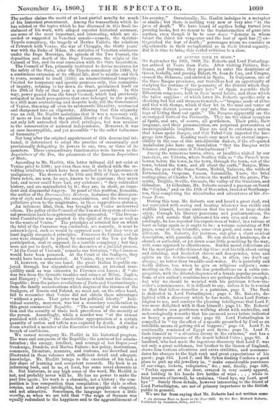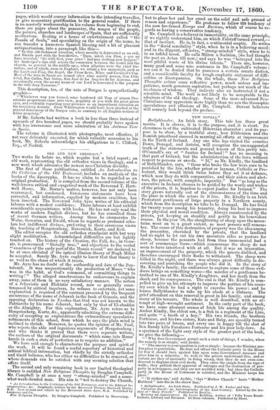AN AL'IT3IN Torn IN SPAIN. * ON September the 19th, 1859,
Mr. Roberts and Lord Portarling- ton arrived at Tours from Paris. After visiting Poitiers, Bor- deaux, and Bayonne, they prepared to enter the dominions of Queen Isabella, and passing Bidart, St. Jean de Luz, and lIrugne, crossed the Bidassoa, and arrived in Spain. In Guipuscoa, one of the three Basque provinces, our travellers had an opportunity of studying the costume of the peasantry of the district which they traversed. These Tipperary boys" of Spain resemble their Hibernian congeners, both in their moral habits' and those which the tailor supplies : of which latter Mr. Roberts specifies only a shocking bad hat and trousers to match,—" brogues made of skins and tied with thongs, which if they let in the mud and water of this rainy district possess at any rate the compensating advan- tage of letting them out again." The Basques apparently are the stereotyped butts of the Peninsula. They are the oldest occupiers of Spain, and are, of course, all gentlemen. Their pride, their language, and their pronunciation, are perpetual provocatives of inextinguishable laughter. They are said to entertain a notion that Adam spoke Basque, and that Tubal Cain imported the lan- guage into Spain. Reading made easy must be an eternal impos- sibility in the case of this antediluvian dialect, if the oft-quoted Andalusian joke have any foundation "that the Basques write Solomon and pronounce it Nebuchadnezzar ! "
Among the numerous towns, cities, or localities visited by our travellers, are Vittoria, where Southey tells us "the French were beaten before the town, in the town' through the town, out of the town, behind the town, and all about the earth," Burgos Mira- fibres, the pees of the Some Sierra, Madrid, Talavera, the wilds of Estremadura, Oropesas, Cuacos, Xarandilla, Yuste, the brief resting-place of Charles V. between the world and the grave, Pla- centia Trujillo, Seville, Grenada, the valley of the Guadairo, and Gibraltar. At Gibraltar, Mr. Roberts secured a passage on board the "Ceylon," and on the 19th of December, landed at Southamp- ton, thus completing the vicissitudes and adventures of his Au- tumn Tour.
During this tour, Mr. Roberts saw and heard a great deal, and not contented with seeing and hearing whatever was visible and audible himself, became anxious that the world at large should enjoy, through his literary panorama and panharmonium, the sights and sounds that interested his own eyes and ears. Ac- cordingly, he has reported his experiences of travel, in a volume at least as large again as it ought to bo ; a volume consisting of 634 pages, some of them tolerable, some even good, and some very in- different. Mr. Roberts, for instance, can give a short seenical description, with passable skill. He can sketch a landscape, do a church or cathedral, or jot down some little pencilling by the way, with seine approach to effectiveness. But his moral reflections are for the most part of the thinnest sky blue ; and his talk about eating and drinking, and Rochefort cheese and flea-powder, wine and spirits on the festive-board, &c., &e., is often, (we don't say always,) no better than twaddle-and-water. He is painfully and feebly diffuse, too, when he gets on religious subjects ; com- menting on the absence of the due genuflections on a cabin eon- aregation, with the diluted eloquence of a female popular preacher. Some of our author's reminiscences arc perhaps allowable enough ; but why we should be wearied with his patrician fellow-tra- veller's reminiscences, it is difficult to say, unless it be to remind us that that fellow-traveller is a patrician, page 3. The Book is dedicated to Lord Portarlington ; page 4. Mr. Roberts' de- lighted with a discovery which he has made, takes Lord Portar- lington to see, and conveys the pleasing intelligence that Lord P. was more delighted with it than himself ; page 14. Mr. Roberts' fidus achates sees gentlemen walking about with umbrellas, and meteorologically remarks that his aneuroid never before indicated so heavy a pressure of rain ; page 62. Lord Portarlington is compelled to "try the effect of a specific prescribed by Ford as an infallible means of getting rid of beggars ;" page 64. Lord P. is continually reminded of Egypt and Syria; page 75. Lord P. finds himself in "a situation dreary in the extreme," and has a temporary reminiscence of the desert behind Cairo ; page 83. A landlord, who had made the ingenious discovery that Lord P. was not only a great nobleman, but brother to the Queen of England, shows him various attentions and extra civilities, and accommo- dates his charges to the high rank and great expectations of his guest; page 343. Lord P. and Mr. Sykes finding Cordova a good place to pick up old jewellery in, " make considerable purchases of ear-rings, lockets, reliquaries," &c. ; and, finally, page 520, " Purkis appears at the door, arrayed in very scanty apparel, and holding in his bands five bottles of wine. . . . while in faint accents of farewell, he exclaims, 'Good bye, my Lord, good bye ' " Surely these details, however interesting to the friend of Lord Portarlington, are not of primary importance to the .13ntieh public in general.
We are far from saying that Mr. Roberta had not written some
• An Autumn Tour in Spain in the Year 1859. By the Bev. Richard Roberts. Published by Saunders, Otley, and Co.
pages, which would convey information to the intending traveller, or give momentary gratification to the general reader. If there is no masterly workmanship in his volume from beginning to end, there are pages about the peasantry, the usages of the people, the palates, churches and landscapes of Spain, that are sufficiently meritorious. Resting at a house of entertainment called "the Posada of Souls," and speculating on the origin of the name, he can transfer a humorous Spanish blessing and a bit of pleasant antiquarianism, into a paragraph like this-
" In this old-fashioned kingdom, where novelty is deprecated as an evil, and friends part with the benediction, Taya, usted, con Dios, v que no haya novedad," Go with God, your grace ! and may nothing new happen !' the innkeeper's sign still attests the connexion between the hostel and the church, so general in the middle ages, when pilgrims were the chief tra- vellers, and of which, even in England, we retain a few memorials, such as the Lamb and Flag, the Angel, the Cross Keys, Mitre and Cardinal's Cap. Most of the inns in Spain are named after some saintly person, San Cris- tobal, San Carlos, San Anton, San Jose de los Angeles ast los Anrenas, and occasionally even the sacred name of our Lord is desecrated to the purpose in the title Jesu Nazareno."
This description, too, of the cats of Burgos is sympathetically graphic- " Whichever way you turned, some hardened old Tom of almost Pre- adamite proportions cause into view, goggling at you with his great green eyes, and evidently regarding your presence as an impertinent intrusion on his hereditary domain. Even Whittington would have been shocked at the general demeanour of the Burgos cats, so contrary to all English notions of feline propriety."
If Mr. Roberts had written a book in less than three instead of upwards of five hundred pages, we should probably have spoken with less irreverence and more admiration of his Autumn Tour in Spain.
The volume is illustrated with photographs, most effective, if not very delicately executed, for which 'valuable accession to his book, Mr. Roberts acknowledges his obligations to C. Clifford, Esq., of Madrid.



























 Previous page
Previous page